I’m trying to imagine what I might find inviting about Mike Newell’s Harry Potter and the Goblet of Fire (Warner Bros., 11.18). Last year I suggested killing Rupert Grint’s Ron Weasley character because he never does anything except whine and wimper, but you know that’ll never happen. If they would only free Harry and Hermione (Emma Watson) from Hogwarts and set them loose upon the world. Send them on the road…send them up against real-world villains and adult situations. But no…we’re going to be stuck at Hogwarts again with the same old gang, and I can’t understand why everyone is so pleased with these films when they pull more or less the same levers and push the same buttons each and every time.
 Jeffrey Wells
Jeffrey Wells
Tracks
Terrorball
There’s an atmospheric gloominess in Joseph Castelo’s just-opened The War Within (Magnolia/HD Net). Almost all the scenes are darkly lit, and the lead character of Hassan (Ayad Akhtar), a Pakistani student who comes to New York to carry out a terrorist bombing, wears a glum, vaguely irritated, don’t-be-trivial-with me expression the whole time.
Knowing as little I do about Islamic martyr types, gloominess seems appropriate. These guys are furious about American aggression in the Middle East and they don’t really see life as something to be lived and savored with any joy. To them it’s all about the payoff in the afterlife, a reward for having fulfilled their spiritual-political mission.

The War Within star and co-writer Ayad Akhtar at Le Meridien hotel — Monday, 10.3, 2:35 pm.
Like Warner Independent’s Paradise Now (10.28), The War Within is about a would-be martyr nursing doubts and second thoughts.
The script, written by Akhtar and Castelo, was inspired by a news story about a Palestinian suicide bomber who was supposed to blow up an Israel bus (or do some kind of public damage), but instead got up and announced who he was, got off the bus, walked over to a nearby field and blew himself up.
< ?php include ('/home/hollyw9/public_html/wired'); ?>
Anyway, it was a vaguely surprising and agreeable thing to discover that Akhbar, whom I met for an interview earlier this week at L.A.’s Meridien hotel, has a buoyant attitude, beaming eyes and gleaming white teeth. In short, Hassan’s opposite number.
Born and raised in Milwaukee, Akhtar graduated from Brown and then became part of Columbia University’s Graduate Film Program, and it was during this phase when he met and becames friends with Castelo and Tom Glynn, the co-founders of Coalition Films, which produced The War Within.
Akhbar is quite bright, clearly focused and articulate…although he speaks in the somewhat formal, carefully regulated way of someone who doesn’t wish to make a conversational error of any kind.
His personality nonetheless undermined a certain prejudicial notion I’ve had in my head for a long time, which is that guys of Middle- Eastern extraction are spiritually devout and self-restrictive to a fault. They don’t want to know about being a vaguely vulgar American and having a beer at a baseball game and all that assimilation stuff. They just want to be serious and tend to their community and marry a virgin, etc.

Akhtar as Hassan, contemplating passage from this mortal coil into a rhapsodic, grape-eating, virgin-ravaging Islamic after-world paradise
One especially ardent outgrowth of this mentality is to become a martyr and leave the earth in a spiritually pure and glorified way.
A lot of people are interested in Islamic terrorism and the general post-9/11, will- it-happen-again?, why-did-it-happen-before? nightmare vibe.
Marc Levin’s Protocols of Zion, a documentary that played at the Sundance Film Festival last January, burrows into the heads of anti-Zionists who believe the Jews were responsible for 9-11.
Jeff Stanzler’s Sorry, Haters, a InDigEnt-funded film that I saw at the Toronto Film Festival, is about an Arab cab driver dealing with a manic type-A woman (Robin Wright Penn) who’s grappling with a bizarre fixation on 9/11.
There’s John Carter’s Fatwa, about alegislator named Maggie Davidson (Lauren Holly) who believes she’s the subject of a terrorist plot.
No one will argue that Steven Spielberg’s War of the Worlds isn’t 9/11-influenced.
There’s a Showtime movie called Sleeper Cell, directed by Nick Gomez, about an American Muslim who infiltrates a terrorist cell.
There’s David Mamet’s Romance, a new play that’s roughly about long-standing hatred between Islam and western culture, and between Israelis and Palestinians.

Albert Brooks in Warner Independent’s Looking for Comedy in the Muslim World
From England there’s another play called Talking to Terrorists, written by Robin Soans and is about some 29 characters, all of whom are in some way involved in terrorism.
I discussed the emergence of all these 9/11-influenced works with Akhbar. We reasoned they’re all coming out now because art always follows a malaise or catastrophe, but it always takes a while for this to happen.
I asked him what he thinks of Albert Brooks’ forthcoming Looking for Humor in the Muslim World. What do Middle Eastern guys laugh about? How many stand-up comics are there who hail from a Pakistani, Palestinian, Saudi Arabian, Iraqi or Iranian background? Akhbar went blank on me. He smiled and said he’s heard of a stand-up comic who fills the bill, but otherwise said, “Sorry,”
I think you have to be a little corrupt, or at least aware of your potential for fallible or foolish behavior, to laugh. It has never seemed to me that Middle-Eastern guys are very accepting of these foibles.
Tracks
There is something in the delicate alchemy of Mark Isham’s In Her Shoes score that really makes it. But what is that exactly?
The right music can sell the emotion in a scene, but it can’t create feelings that aren’t there to begin with. It can only embroider or emphasize. But lay the music on too thick or make it too loud and movie music can feel gross and intrusive.
I don’t know how much of the music for Two For the Money was written by com- poser Christophe Beck and how much of it is previously recorded, but it nearly murders the film during the first ten or twenty minutes. It’s awful wah-wah stuff …early `70s Curtis Mayfield street-funk, and played so loud it makes you wonder what the post-production guys were sniffing.

In Her Shoes composer Mark Isham
The word is obnoxious. It told me right off, “You’re going to hate this film”…and it made good on that.
The opposite happened when I heard Isham‘s music. It turned me on to the undercurrent in Curtis Hanson’s girl film…an ever-so-slight nudge.
The word is delicacy. If Isham and director Curtis Hanson had pushed it a tad more, if they’d tried to sprinkle more feeling in, audiences would sense the over- sell and pull back.
What’s interesting is that Isham didn’t write a “score” for In Her Shoes — he wrote a series of small moments. You could call him a kind of colorist. He’s written full- out scores for other films, but not here.
More music for In Her Shoes might have tipped it over. The movie runs on its own karma, but it’s fascinating how Isham’s music fine-tunes the emotional stuff in just the right way.
Here are three samples, heard when (1) Maggie (Cameron Diaz) finds a batch of letters written to her by her grandmother (Shirley MacLaine), (2) when Norman Lloyd’s retired professor character compliments Maggie for being insightful, and (3) when Toni Collette is doing her dog-walking on the streets of Philadelphia.

In Her Shoes director Curtis Hanson
A flavoring here and there…a few dabs of paint.
I happen to really like Isham’s Crash score, and this passage in particular.
“Every one of us” — film music composers — “has a style that we’ve honed over the years,” Isham told me over the phone. “I work in a fairly wide area….from In Her Shoes to Blade to Spartan to Miracle, and I guess I’m thought of as a colorist.
“Crash is the most interesting thing I’ve done recently,” he says. “For me it was a real return to electronic music…all of it done by myself. I’m probably the most proud of that score.”
Isham is now scoring Running Scared, the new film by Wayne Kramer ( The Cooler) that he calls “a very dark adventure…a grown-up nightmare.”
New Line is releasing it in early January. Paul Walker, Vera Farmiga, Cameron Bright and Chazz Palmintieri costar.
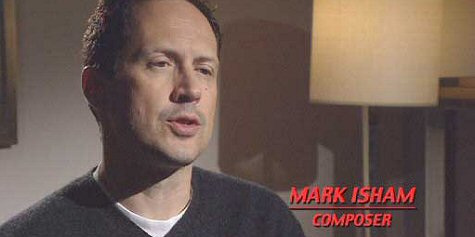
I think Isham did a fantastic job with Miracle, the Kurt Russell Olympic hockey movie. “I also have a reputation of being able to write a melody,” he says, “and Miracle is big thematic score.”
Isham was born in New York, grew up in San Francisco, and played trumpet in the San Francisco Opera orchestra. Then he played with a rock band called Sons of Champlin, which did pretty well and toured the globe with The Beach Boys and Van Morrison.
In ’79 Isham formed Group 87, a progressive jazz ensemble and in ’83 began a parallel career as a soloist.
His first movie-composing gig was in 1983 for Carroll Ballard’s Never Cry Wolf. I remember being moved by his score for the Oscar-winning doc The Times of Harvey Milk, which came out the following year; ditto his scores for Alan Rudolph’s Trouble in Mind, The Moderns and Love at Large.
“I was always a huge fan of Nino Rota and his Godfather scores, for the way it’s heart wrenching without being maudlin. There’s a real restraint in that.”
The biggest difference between film scoring now and how it was 20 or 30 years ago “is that we have the craft and the tools to put our temporary scores onto the film’s temp soundtrack and preview everything. We can work fast and get it right before it leaves the house.”
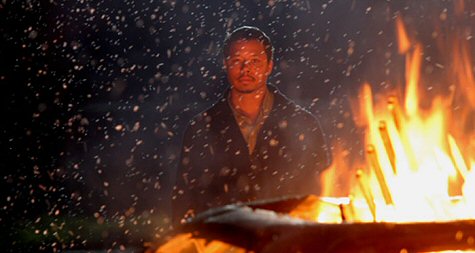
Terrence Howard in Crash
Isham’s music editor is a guy named Tom Carlson, with whom he’s worked on “maybe 20 or 30 movies.” A music editor’s job is to help with the synchronization and put it exactly where it should be, at exactly the right moment.”
The In Her Shoes score was played by two guitars, a bass, percussion, drums, harp, cello, two keyboards and strings.
Isham originally wrote about an hour’s worth of music for /In Her Shoes, but only about 20 minutes worth made it into the film.
“I try to find the voice for every picture. I think that’s what composers strive for. You don’t want to hit people over the head. If you do, you pull them right out of the movie. It’s all in the rightness and the timing of it.”
Squid Guys

The Squid and the Whale star Jesse Eisenberg at Le Meridien hotel — 10.7, 12:15 pm.
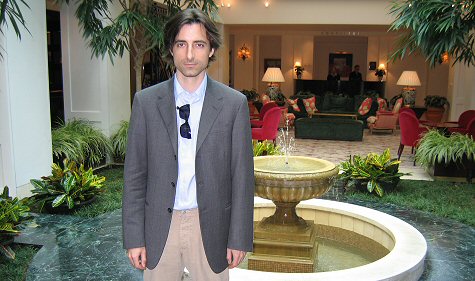
Noah Baumbach, director-writer of the mostly autobiographical The Squid and the Whale at same hotel — 10.7, 12:35 pm.
Don’t, He Says
“I saw your item about George Clooney planning to remake (i.e., fuck with) Network, one of my five favorites of all time. Really. No hyperbole here. Hypnotizes me every time I watch it.
“Listen to this clip of Faye Dunaway and Robert Duvall together….when was the last time you’ve heard dialogue of this calibre, with this kind of energy?
“It seems obvious that the reason Clooney is doing this is that’s he’s bored stiff.
“There is such an abysmal lack of good scripts out there that these actors are just plain sick of playing crappy roles with no balls attached to them, no substance or ambiguities, no depth. Same action hero, same romantic comedy, same Big Shot Behind a Big Desk Role. Zzzzzzzzz…these actors are ready to kill themselves.
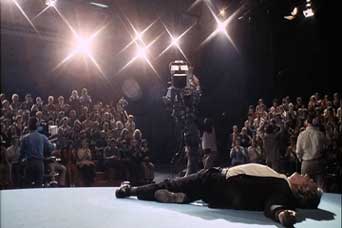
Network
“Yeah, yeah, yeah: cars, mansions, money, pussy, personal trainers, these- people-have-nothing-to-complain-about blah, blah, blah. Maybe so, but you put anyone in a creative rut and you’ll bring them to their knees. So it’s a problem. Not only for them, but for us, the viewers.
“This creative bankruptcy is crippling Hollywood’s output right now. Combine the Not-Enough-Good-Scripts Problem with the Studios-Have-No-Guts Problem (which ensures that any bold new script — should it actually find its way onto the desk of a studio executive — will be treated as if it were a coiled, frothing swamp adder: beaten to death in a terrified frenzy by the exec’s assistant and scraped into the shitcan) and you have peace of mind that there will be very few classics in the years to come.
“Clooney is a smart guy, and he knows that he’s in a position to do pretty much anything. I admire that he’s actually attempting to do so. Between his work with Soderbergh and doing stuff on his own like the Murrow film, he’s at least trying. But NO ONE is gonna go see the Murrow movie. And NO ONE is gonna see the Syriana thing, either. (Just being realistic here…)
“So we have a genuine Movie Star with no Star Vehicle. A king without a kingdom. So he’s doing what lots of these actors do: they pine for the good ol’ days.
“And so one night, some actor, like Clooney, is watching some classic on TV late at night and says to himself…
“God, I wish I could have played that role. But I
can’t do that role…that’s been done, it’s BOGART for fuck’s sake. I can’t fuck with that. I’ll just continue reading this new script my agent gave to me today. He said it was by some new hotshot who just directed that Britney Spears video.
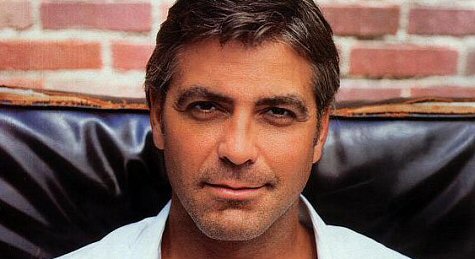
George Clooney
“Let’s see…I play a wise-cracking, judo-chopping, pussy-sniffing, seen-it-all, fucked-it-twice cop on the edge who has to bring down a gang of drug-smuggling, glock-blasting, tattoo-covered Hispanic ninjas, all the while showing my new rookie partner the ropes. Christ, where’s the Vicodin? Oh, wait, this is my favorite part of the movie…
“God, I wish I could have played that role.
“An actor knows he/she can always end up playing Willy Loman or Juliet on the stage, but classic movie roles are sealed forever. Right? Would anyone dare to try and redo Rick Blaine? Margo Channing? Bonnie Parker? Benjamin Braddock? Popeye Doyle? Norman Bates?
“Ah, see…all been done. Albeit badly, but it has been done. And an actor knows that, too.
“And the next day the actor slips that thought in oh-so-casually to their agent at lunch (“Hey, you know what movie I was watching last night?”), and it suddenly becomes Something.
“And it’s only a month or so later you read in Variety that So-And-So is slated to play This Classic Role in the upcoming remake of They’re Fucking With My Favorite Old Movie, Those Fuckers.
“Clooney should back off. Remaing Network is a stupid idea tailored for someone much more desperate.” — Mark Smith, PhD hailing from the 718 area code.
Three Points
“Point #1: It’s heartening to know that films The War Within are attempting to explain what we’re up against in the war against Mideastern terrorists. My sister-in-law is a Saudi, and I have found her cohorts in the main to be humorless and self-absorbed. The fundamentalist Muslim is indoctrinated and imbued with a sense of superiority. Then they encounter a higher western world run on science, business, and free thinking. Dissonance festers in their souls when they cannot reconcile their place in the world. Their personal war within thus manifests with acts of terror.

“Point #2: The piece on Mark Isham reminds that music is such and integral and underrated thing in a good film. You called Isham a ‘colorist.’ That’s an excellent way to describe bits and pieces of music that enhance a film, but do not reach the magnitude of a score. ‘Color’ or ‘colorist’ are terms which could be used in film credits, especially those where original music augments a soundtrack that is mainly a pastiche of pop music hits.
“Point #3: how do films with quality akin to canned ravioli, such as Two for the Money, get made? Its all such a cliche: Al Pacino’s avuncular-guttural utterances, Matthew McConaughey’s 80’s greaser look, the Superfly-derivative soundtrack. And if McConaughey’s character is such a wiz prognosticator, why didn’t he just cut out the middleman and bet the games himself in Vegas? Duhh.” — Arizona Joe
See It Now
Good Night, and Good Luck deserves a pat on the back and then some for doing a reasonably good job, but before you see it (and I’m recommending that you do) you have to understand why it feels a little bit constrained and hemmed in.
Director, cowriter and costar George Clooney didn’t make it this way accidentally, and I’ll explain why I think he chose this approach in just a second…but there’s a theory at work here.
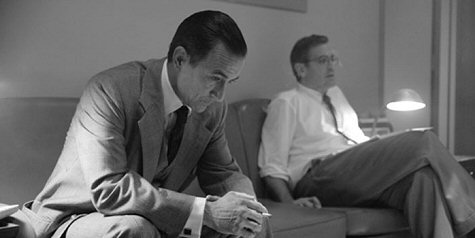
David Straitharn (l.), George Clooney in Good Night, and Good Luck
GNAGL tells the story of how CBS newsman Edward R. Murrow, in the space of a single broadcast, struck the first meaningful blow against that heartless Wisconsin ratfucker Sen. Joseph McCarthy, who helped destroy I don’t know how many lives in the early 1950s by casting doubts about people’s loyalty to the U.S.
Murrow was the only big-time media guy with the guts to spear McCarthy, which he did by simply standing up (or sitting down, rather, in front of a TV camera) and calling him a questionable loose-cannon.
So here’s to Clooney for doing a better-than-reasonably good job, all things considered.
The film feels authentic. The atmopsheric elements seem right. The script is focused and pared down and thematically lucid. And Clooney deserves some of the credit, naturally, for David Straitharn’s enthralling Murrow performance.
He doesn’t quite give you goosebumps like Phillip Seymour Hoffman’s Truman Capote, but Straitharn perfectly captures the Murrow that I’ve seen on kinescopes of those `50s broadcast. The portrayal of Murrow on the pages of Clooney and Grant Heslov’s script may seem overly spare, but Straitharn more than holds up his end.
These fine things aside, GNAGL is not, despite what those editors and copywriters on the Newsweek/MSNBC site are saying, a “hot must-see” film. It’s decent and smart…a kind-of message movie (as in, “hey, TV newscasters of today…you’re gutless!”)…a salute to backbone… a nostalgia film for thinking-persons-over-40…a dip in the pool.
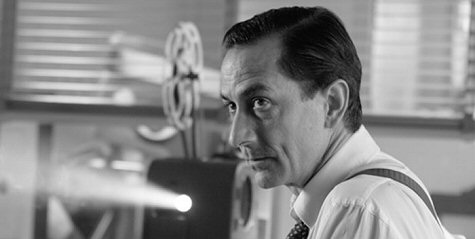
The truth is that everybody I’ve spoken to seems a bit muted about it. They’re all saying “yeah, pretty good” but nobody’s hopping up and down. It gives you what it gives you, they’re saying, but this doesn’t seem like enough.
And yet — here’s the thing I spoke of earlier — this shortfall feeling disappears if you accept that Clooney didn’t make a movie for our time or sensibility. He’s made, very conscientiously, a film that apes the look and feel of black-and-white live TV drama — an NBC Playhouse movie with only six or seven indoor sets. He’s made it as if Good Night, and Good Luck is being performed live on a New York TV sound- stage in, say, 1955 or ’56…a year or so after the Murrow-McCarthy showdown.
See it with this in mind and it’s a very good film. Like Hilton Kramer explained in that famous early `70s N.Y. Times piece that inspired Tom Wolfe’s The Painted Word, unless you understand the theory behind this or that vein of art, you can’t really “see” it.
If I were Warner Independent, I would hand out leaflets that explain Clooney’s method. It might not make a big difference in how they respond to the film, or what they tell their friends (especially with under-30 viewers, who couldn’t care less about the glory days of live TV drama) but at least they’d “know.”
I would have added more period atmosphere if I’d directed. I would have thrown in footage of Straitharn and his CBS cohorts walking the streets of New York circa 1954, with fast glimpses of Studebakers and Hudsons and theatres playing On The Waterfront and Executive Suite. This would have been a snap with today’s CG.
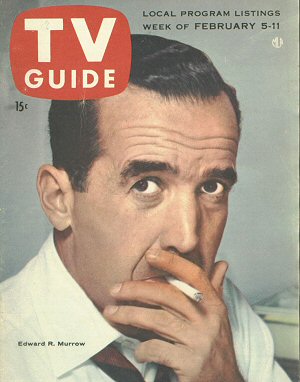
I would have added more shading to Murrow. He’s just a rock-ribbed man of virtue here. He needs some ticks and peculiarities. Men of consequence are usually driven by more than what they believe in and are willing to fight for. If he had a thing for butter pecan ice cream, let’s say. Or if he lost it every time he heard Abbott and Costello’s “Who’s on First” routine.
The character of news anchor Don Hollenbeck (Ray Wise), who committed suicide over being attacked as a “red” by New York columnist Jack O’Brian, feels a bit sketchy. He seems never-wracked for some other reason…money, booze. I just know the “whoa” effect doesn’t kick in when his death occurs.
Robert Downey and Patty Clarkson’s secretly-married characters are intended as a kind of Greek chorus, giving us a ground-level idea of what it was like to work for CBS in those days when everyone was on edge and worried about who would next be accused of being a closet commie.
Thing is, there’s a scene near the end between these two and Jeff Daniels’ upper- management prick Sig Mickelson that doesn’t seem to make sense. Daniels tells them that their secret (CBS policy forbids married couples from working in the same environment) is out and they should probably think about tendering their resignations, or at least one of them should. I’ve thought and thought about this scene, and I still don’t understand why it’s in the film.
(CBS went along with pressure to blacklist several performers and writers during this period. Murrow must have personally known some of the victims. Why didn’t GNAGL dramatize one of them being put through it?)

There’s also the cigarette smoke, which turns the movie into a kind of death trip. Murrow-Straitharn smokes so much you feel like you’re going to end up in intensive care from just watching him. (Murrow died from lung cancer in ’65.) Being an ex- smoker, I was half-focused on the film and half on the cost of medical insurance.
I loved Frank Langella’s performance as CBS chairman Bill Paley. I know very little about Paley’s personality, but he seems to get it just right.
And while it was a good idea to show the real McCarthy with old newsreels rather than cast an actor to play him, Clooney should have cleaned up the McCarthy footage so it looks as fresh as it did in ’54. It looks way too withered and scratchy as is.
I’ve been told that in GNAGL’s footage of the interrogators at McCarthy’s table during a Congressional hearing, that one can glimpse a very young Robert F. Kennedy sitting far to the left of McCarthy and his henchman Roy Cohn. I’ve seen the film twice and missed this both times…if Kennedy is there. Anyone?
Salon‘s Stephanie Zacharek nailed it when she said the film is “basically [about] watching a bunch of white guys getting together in a room, talking (and smoking) a lot, and then one of them, Murrow, writes something and goes before the camera.”
That really is it, but GNAGL does this contained but gripping white-guys-in-a- smoky-room thing quite well. Just remember to remember the theory.
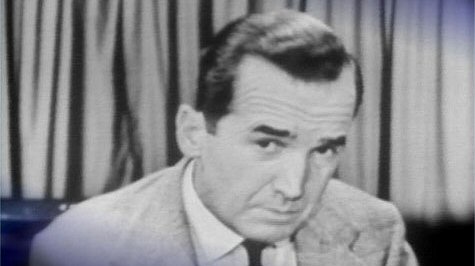
Edward R. Murrow during his March 1954 broadcast in which he castigated Sen. Joseph McCarthy.
The decision by Nicolas Cage
The decision by Nicolas Cage and wife Alice Kim Cage to name their just-born son Kal-el is…how can I best put this?…deranged. Can you imagine growing up knowing you’ve been named after Superman (i.e., his Kryptonian name)? This ranks with Frank Zappa naming his daughter Moon Unit and that dirty mangy dog in the Johnny Cash song naming his son “Sue.”
I’ve seen a demo of
I’ve seen a demo of Sony’s Blu-ray high-definition DVD process, and I’ve asked two or three people about the differences between it and Toshiba’s HD-DVD system, and it comes down to this — Blu-ray is a more expensive process but it’s more high-end…more digitally au courant and forward-looking…and HD-DVD, which I haven’t seen, is more of a backward-designed system but it’s cheaper to work with. There are one or two other twists and wrinkles, but that’s what it basically comes down to, trust me. And you won’t find any trade reports anywhere that just say that. The latest development in the DVD high-def techno-clash is that Paramount Home Entertainment has decided to support both the Blu-ray and the HD-DVD system. Scott Hettrick’s Variety report says that “several execs in each camp believe the Paramount announce- ment to publish in both formats, which is the direction Warner has been leaning for the past week or two (with a similar announcement expected this week), is simply a temporary face-saving strategy and that ultimately all studios will shift completely over to Blu-ray by launch time [in the spring of ’06].”
There’s a DVD series called
There’s a DVD series called “Sundance Festival Favorites,” and the distributor is the curiously-named Genius Products, Inc. Curious because one of the titles, which is due for release on 10.25, is Jill Spreicher’s Clockwatchers(’98), a comedy about office angst and girl empowerment that costarred Toni Collette, Parker Posey and Lisa Kudrow. Curious because Clockwatchers wasn’t even a slight favorite at the 1997 Sundance Film Festival…it died there. The word was so negative that it took another year and a half for the film to find its way into theatres. It opened on 5.15.98.
A lot of journos (including
A lot of journos (including columnist Emanuel Levy) have written pieces about the just-passed 50th anniversary of James Dean’s death, which happened around sundown on 9.30.55. But how many have driven up to the actual collision spot in Cholame, California, and…you know, gotten out of the car and stood there and closed their eyes and smelled the air and let the lingering vibe of that tragedy (and believe me, you can still feel it) sink in? I’m just asking.
I slipped into a 9:45
I slipped into a 9:45 pm showing of Capote Saturday night (10.1) at the Arclight and there were only two or three unoccupied seats. Bennett Miller’s film averaged a bit more than $25,000 per screen with a haul of $303,000 in just twelve situations. A good start, but a film like this needs to pace itself. Then again, how can any semi-intelligent movie fan go through the next four or five months without seeing Phillip Seymour Hoffman’s knock-down Oscar-calibre lead performance? There’s no ducking it.
Here’s a nicely written Roman
Here’s a nicely written Roman Polanski interview piece by the Guardian‘s Sue Summers. I’m now into catching Oliver Twist, which I didn’t feel like making an effort to see during the Toronto Film Festival. Polanski doesn’t like to sit down with journalists. I tried to speak with him in Paris in ’02 when the Oscar chances of The Pianist were looking uncertain, but he woudn’t do it. Something tells me if Summers had been a fat balding male, the sit-down might not have happened. And it’s a tiny bit curious that Summers pretty much blows the privacy thing with this graph: “A week later I am sitting opposite Polanski in L’avenue, a trendy restaurant situated among the Guccis and Chloes of smart Avenue Montaigne, just next door to where he lives with his third wife, the 39-year-old French actress Emmanuelle Seigner, and their two children, Morgane, 12 and Elvis, 7.”
Nobody at Warner Bros. told
Nobody at Warner Bros. told me about any screenings of Carroll Ballard’s Duma, which has been called an excellent & moving kids-and-nature movie by Scott Foundas and Roger Ebert, and it’s now hitting me I have to pay to see it at a theatre this weekend ….great. If I don’t go it’ll probably be yanked and then I’ll have to wait four months for the DVD.
Reactions to Susan Stroman’s The
Reactions to Susan Stroman’s The Producers appear to be sharply divided at the very least, and that’s not just another way of saying the reactions are “mixed.” The movie has a lot of fans. A guy who attended last Thursday’s research screening wrote that “even though my entire group (myself plus three friends, all of whom see a fair number of flicks) despised The Producers, there were those in the audience who were clearly having a good time. They were clapping after every song. But for me, all the zip and brains of Mel Brooks’ original 1968 movie have been sucked out in favor of sight gags, ugly cliches and awful song-and-dance sequences. Susan Stroman, the director, proves herself completely incapable of creating a movie that doesn’t look like she dropped a camera in the center aisle at the St. James and went to sleep.”
It’s not lead actress Zhang
It’s not lead actress Zhang Ziyi but supporting actress Gong Li who’s the sensation in Memoirs of a Geisha, or so I’ve been told…
Hmmm….a moderately interesting piece by
Hmmm….a moderately interesting piece by the N.Y. Times‘ Sharon Waxman about a recent visit to the set of Paul Weitz’s American Dreamz, a $19 million political satire that will stick it to Team Bush. My first thought was that the film could date very quickly, depending on what happens in the news…but maybe not. Dennis Quaid is playing a “clueless, if good-hearted head of state named Staton…Marcia Gay Harden plays his Laura-like wife who calls him ‘Poopie’…Willem Dafoe, a senior presidential adviser of the Karl Rove kind, gives the president ‘happy pills’ and fits him with an earpiece…Hugh Grant stars as the gratuitously nasty host of a popular television singing contest called ‘American Dreamz.’ And a novice actor, Sam Golzari, plays Omer, a suicide bomber with a penchant for American show tunes.” Weitz tells Waxman, “If people don’t have anything to say about [this film], it will be really disappointing.” Get it out soon, fellas!
